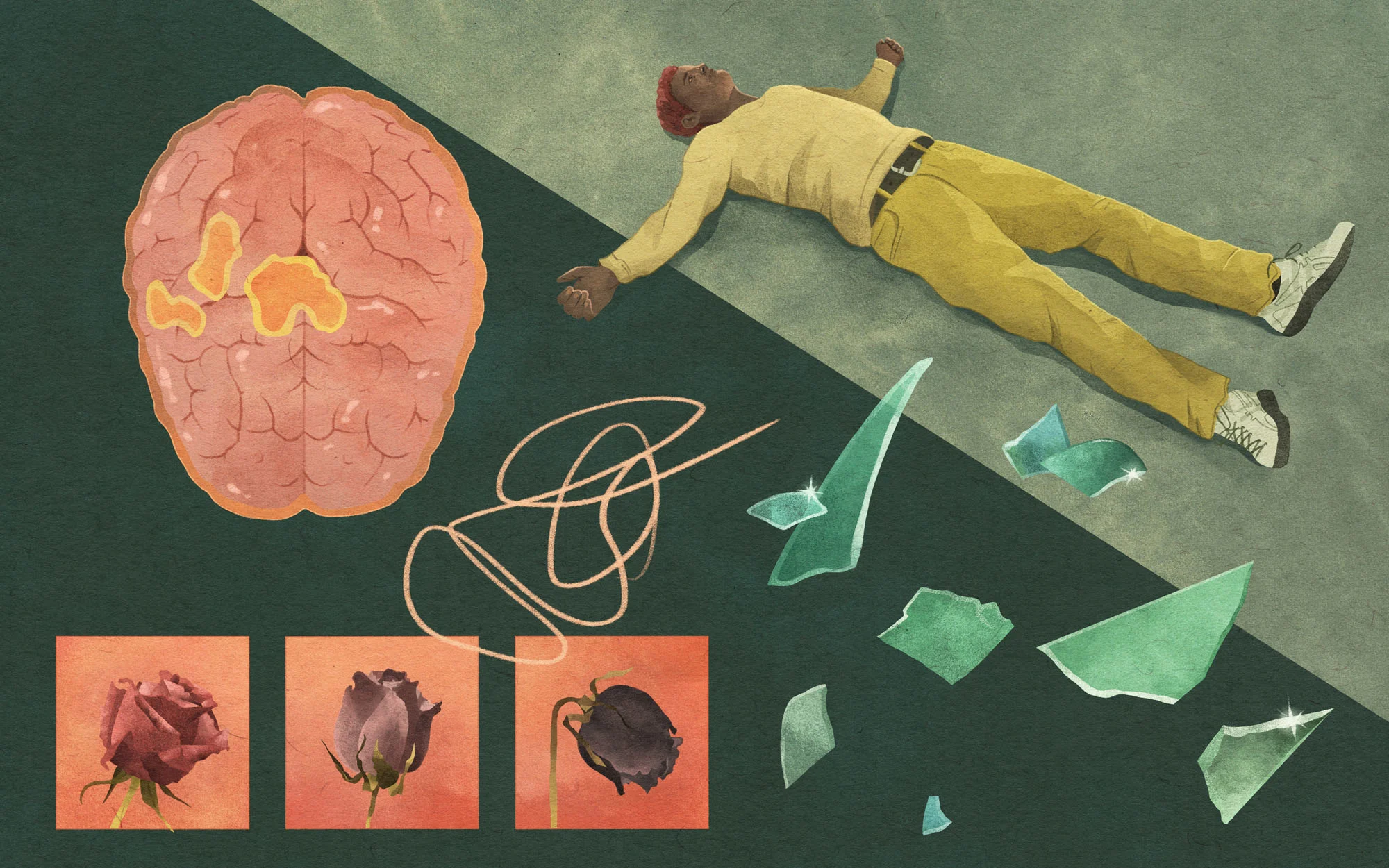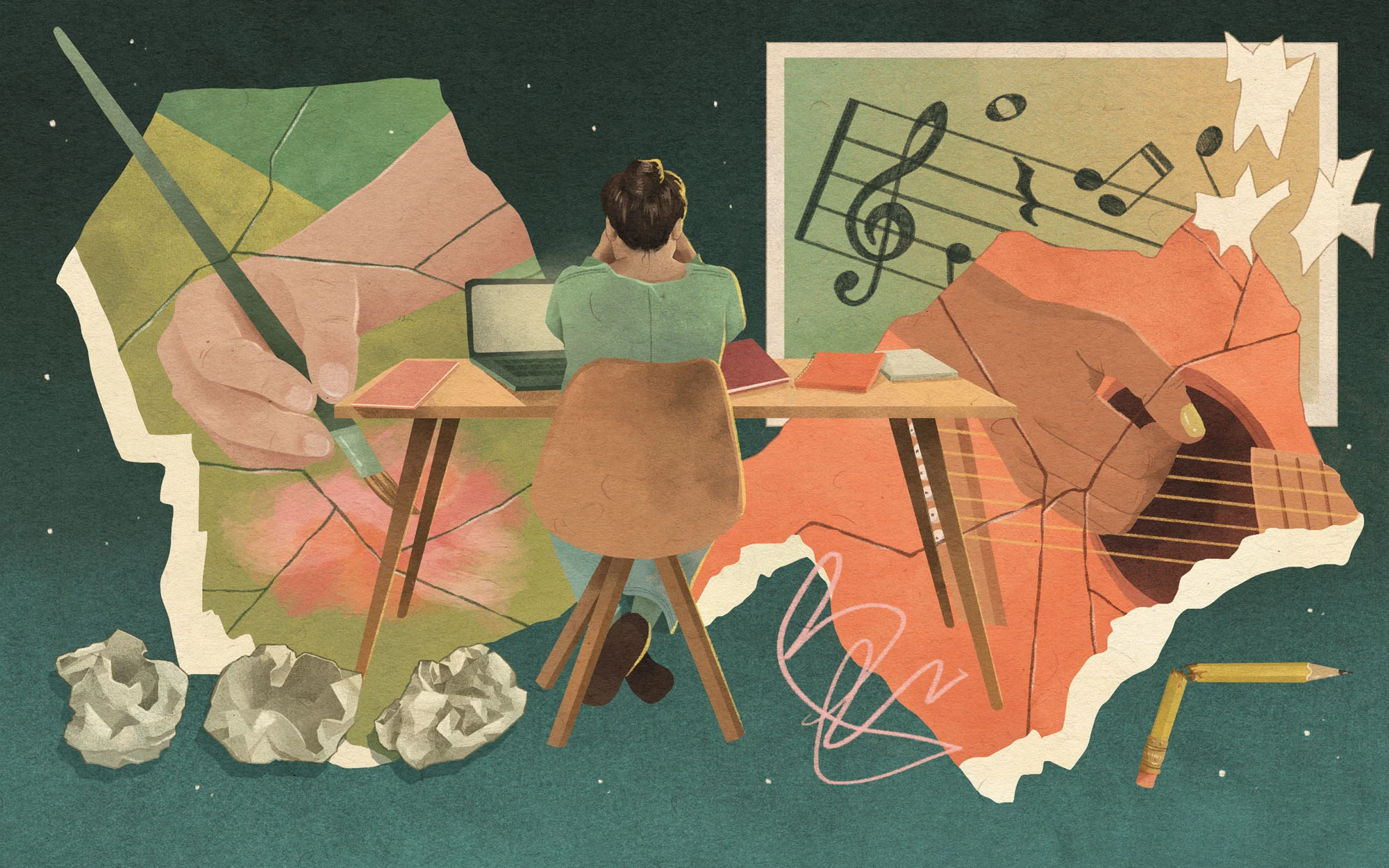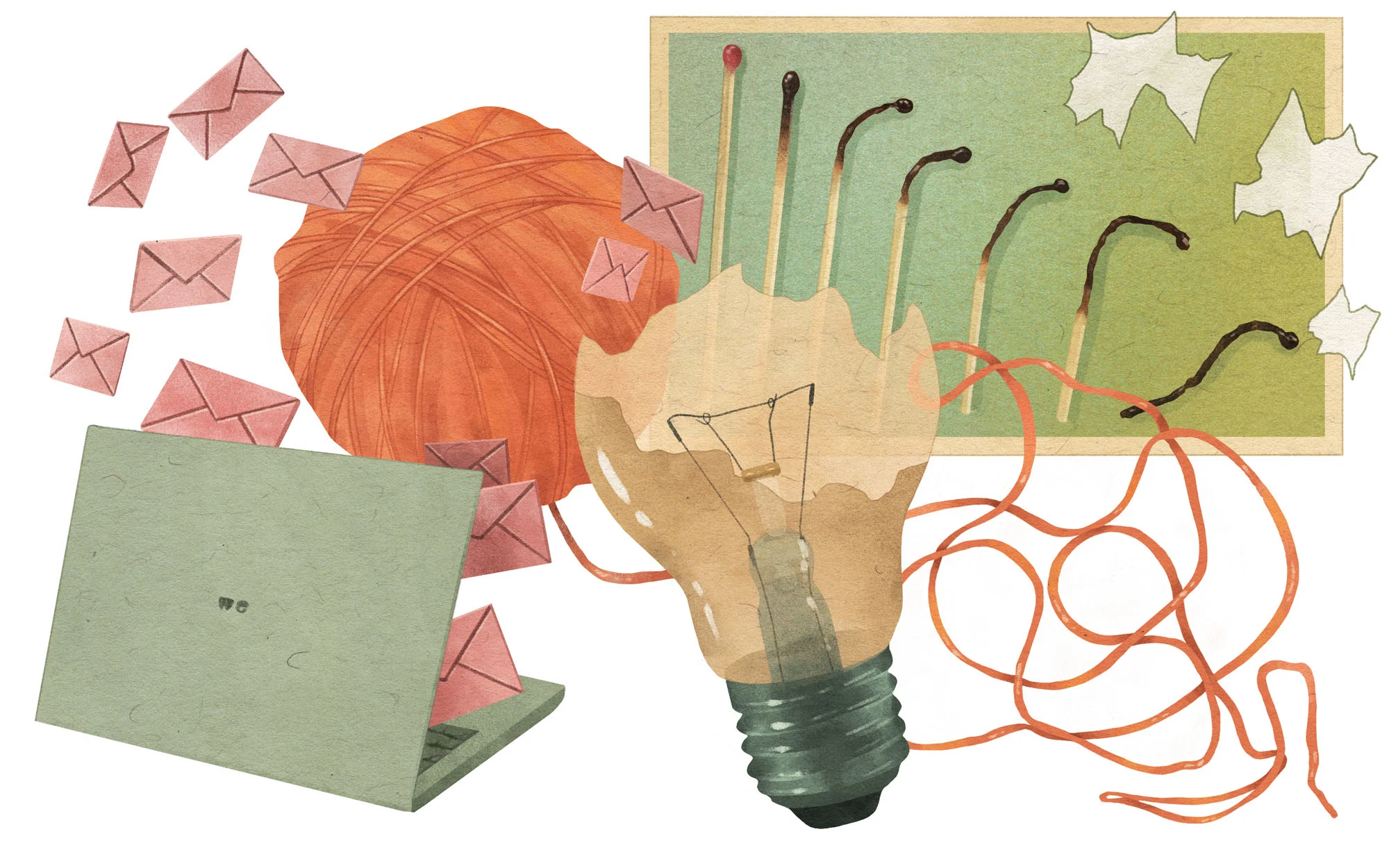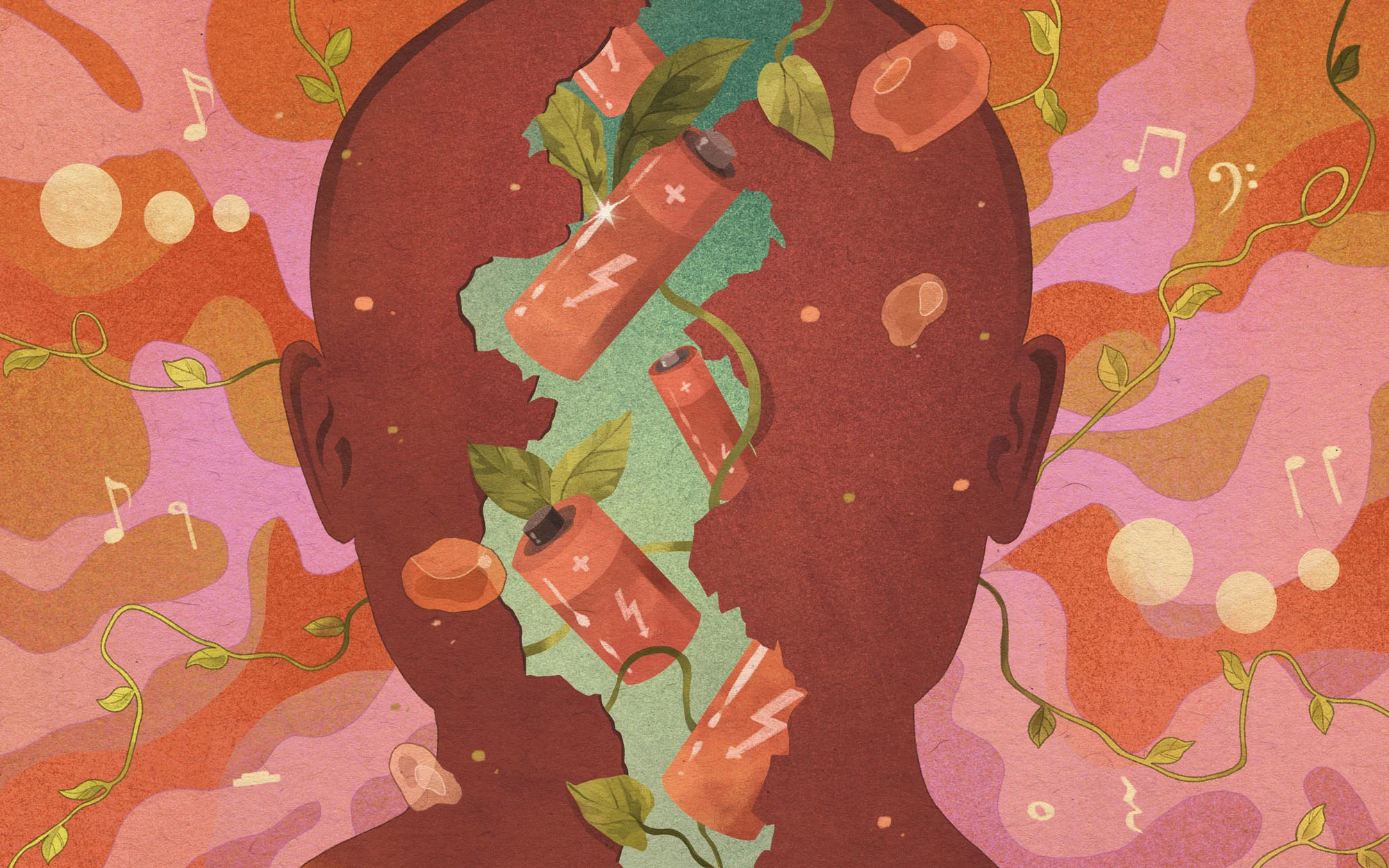

The current wave of strike action has seen burnt-out workers band together in the fight for better, more sustainable working conditions. Though creative workers have yet to join the picket lines in droves, our industries are rife with the sort of precarious contracts, low wages, impossible hours, and blurred boundaries that could demoralize the most motivated among us. Here, James Cartwright finds out how to avoid the burnout trap from creatives who have survived it.
Illustrations by Michelle Urra.
In a recent essay for the Washington Post about our relationship with nature, wealth, time and the climate crisis, the writer and historian Rebecca Solnit evoked William Wordsworth (this banger, since you ask): “‘Getting and spending, we lay waste our powers,’” she quotes. “What would it mean to recover those powers, to be rich in time instead of stuff?
“For so many of us, being busy with work has leached away our capacity to pursue true riches. What if we were to prioritize reclaiming our time—to fret less about getting and spending—and instead ‘spend’ this precious resource on creative pursuits, on adventure and learning, on building stronger societies and being better citizens, on caring for the people (and other species and places) we love, on taking care of ourselves?”
The focal point of her article is that society needs to reframe the way it places value on time and money in order to address the climate crisis, but her question is equally applicable to the phenomenon of burnout that’s endemic in late-stage capitalist society. How is it that so many of us are so enthralled by getting and spending that we pursue it to the detriment of our mental and physical health, and is there anything we can do to prevent it?
We award few accolades to people who achieve a good work-life balance. But people who earn big money win big prizes.
In 2019, the World Health Organization included burnout in its 11th revision of the International Classification of Diseases as an occupational phenomenon (not a medical condition), defining it as “a syndrome conceptualized as resulting from chronic workplace stress that has not been successfully managed. It is characterized by three dimensions:
feelings of energy depletion or exhaustion;
increased mental distance from one’s job, or feelings of negativism or cynicism related to one's job; and
a sense of ineffectiveness and lack of accomplishment. reduced professional efficacy.
Sound familiar? According to a 2021 McKinsey survey, 42% of women said they were consistently burned out at work, while 35% of men reported the same. Another report found that millennials (59%), Gen Z (58%), and Gen X (54%) shared similar burnout rates. (I won’t risk fuelling any anti-boomer sentiment by sharing how burned out that generation apparently feels, but they seem to be doing okay.)
Solnit argues that our inability to divorce ourselves from material consumption stems from making success synonymous with the accumulation of money, and “stuff.” We award few accolades to people who achieve a good work-life balance, or whose mental health is stable because they’ve become experts at turning down work they don’t need. But people who earn big money win big prizes.
Burnout is also a result of the working environment we operate in: the structural inequalities at play across our industry, and our inability to escape them because we have neither the financial means to do so, nor the ability to pursue an alternative. We like to imagine that this isn’t the case in the creative industries. Here, we’re supposedly free to work on exactly the creative pursuits that Solnit is so keen for us to engage in, to build stronger societies with the work we produce, and to take on projects that help others to be better citizens. That’s the pitch at least. But the reality can often be very different. Like so many others, ours is an industry of precarity that serves other precarious industries, and the exploitative labor practices that we see in other fields spill into our own.
“We’re not removed from what is happening outside socially, politically and economically,” says journalist, editor and broadcaster Kieran Yates. “So when we're having this conversation in the midst of historical strike action, which brings together collective workers struggles and unionization, and thinking about wage labor, these are conversations that should filter not only into our own personal politics and approaches to work, but also into our industry at large.”
Exploitation in our industries comes in many forms. We see it in unpaid internships that still proliferate despite decades of promises to rule out the practice. We see it in the lack of apprenticeships and entry-level opportunities for young graduates. We see it in the lack of representation of marginalized communities across all disciplines. We see it in the pressure put on young people or those new to the industry to “earn their stripes” before they can expect regular work. In the absence of proper support for people in the early stages of their careers, young workers are easy to exploit. And all of this exploitation leads eventually to burnout.
Yates graduated in 2009, and like many millennials, found herself looking for her first professional employment in the wake of a crippling recession, with graduate opportunities that were previously abundant now in short supply. “Even though I knew that the field of journalism was going to be competitive, I had no real understanding of how thin on the ground not only jobs would be, but also apprenticeships and training.”
Without a clear route into the industry, she did everything she could to get a foot in the door. “I wrote for my university paper and they let me do a little bit after I was a post-grad. I did flyering for pub nights to support myself and to try and get in with music industry people so I could do reviews and put them on my blog. I did unpaid internships. I did waitressing and various other hodgepodge bits of receptionist work to pay the bills. Then the rest of the time I was just emailing people for coffees and trying to get paid for work. Sometimes I did, sometimes I didn't.”

Ours is an industry of precarity that serves other precarious industries, and the exploitative labor practices that we see in other fields spill into our own.
Yates got her big break writing an online blog for The Guardian’s music section (for which she was paid £80) and after that, the work slowly began to trickle in. But journalism, her chosen career, accounted for only about 10% of her earnings, and she was in a constant state of worry and, latterly, burnout.
“I felt exploited,” says Yates, “and the exploitation really came from that period of people trying to crack the online conundrum of how you monetize media online. Very often blogs powered by brands would give young writers like me free tickets to things and we’d write reviews without being paid. For years I was working for brands for free, and it wasn’t until a lot later that I realized brands had a lot of money.”
The landscape didn’t look all that different for illustrator and children’s book author Dapo Adeola when he made the move into illustrating full time in 2017. Despite being well into his 30s, he was new to the profession and felt he had to earn his stripes and learn everything on the job to carve out a career that paid the bills. He didn’t work for free, but said yes to every opportunity that came his way. Going into lockdown in 2020, he’d had a couple of projects published, but by the time he’d come out of it, he’d illustrated 10 books and published another eight.
“It was ridiculous,” he says. “I was already burnt out from the first few years and then we went into the pandemic, which gave people the illusion of rest. But it was just the opposite. I could easily slip into work for hours and hours on end, and I did just that.”
In spite of the fact that those two years pushed Adeola to breaking point, and he admits to being utterly burned out by the end of it, he wouldn’t change the experience. “I don't regret it to be honest,” he says. “I learned a lot about my potential, my capacity. I learned so many lessons and I achieved so many different things during that two year period.

All of us are operating in that particular political and ideological system. And it’s not going anywhere in the short term.
“I think there’s a correlation between burning out and breaking boundaries. It’s really difficult to [creatively] transcend where you are without it. Maybe when you’ve earned your stripes and are well on your way in the industry you can take some time out to explore new territory and you don’t have to burn out.”
He likens the process to a session at the gym. You can go on all the machines and break a little sweat, but unless you really push yourself “to the point where your body burns out,” then you’re never going to see results. What’s crucial, he says, is to learn to see burnout approaching and, just like you would at the gym, to rest and recover when it happens. If you don’t, then things get bad. “Burnout feels like my thoughts don’t connect,” says Adeola. “Burnout feels like not being able to focus. Burnout feels like loss of appetite. Burnout feels like one too many fucking emails.”
Burnout can also lead to work you’re not personally happy with. While he’s proud of what he achieved, Adeola has mixed feelings about the work he produced during those two years of isolation. “I took on more books than I should have,” he says. “So I ended up working with multiple deadlines alongside each other. And it meant that I was never able to give 100% to any particular book. Even though the books went out there to kids and they connected with them, they loved them, I wasn't happy with the work I was producing.”
This is a theme explored in-depth in a recent report commissioned by Lucy Bourton of It’s Nice That. The Lazy Report looks at the ways in which “laziness”—or at least just having agenda-free down time—leads to better ideas, better work, and more satisfaction with that work. “Productivity is often pinpointed as the key to creative output,” reads the report introduction. “From agencies to individuals, creativity is not only judged on the quality and scope of the work, but also on the frequency with which that work is created. This amount of pressure increases a sense of competitiveness among the creative community, but crucially it makes it harder to actually produce anything, too.”

After COVID, there was a strange tension for many people returning to their usual patterns of work. While under lockdown, many people, like Adeola, had been working extra hours each day. Research at the time found that home-workers were funneling more and more hours into their jobs during the pandemic, with workers in the United Kingdom, Austria, Canada and the United States clocking an additional two hours per day. At the same time, people were realizing that overworking wasn’t, in fact, necessary. “So many different terms had been introduced to describe that,” says Bourton, “like ‘the great resignation,’ and ‘quiet quitting’ and ‘goblin mode.’ And it just felt like there was this running thread of people accepting that they don't have to work as hard as they've always been told.”
In her 2021 book “Lost In Work,” writer Amelia Horgan is even more blunt about the issue. The old adage that hard work pays off, she says, is simply a lie. The problem at the root of it, she argues over 100-odd pages, is capitalism, pure and simple. And now we’re back to Solnit, work, and the climate crisis again.
But here’s the rub: all of us, whether illustrator, photographer, journalist, musician, editor or whatever niche career we’ve found for ourselves, are operating in that particular political and ideological system. And it’s not going anywhere in the short term. Even in Europe, where some nations have had legislation to protect work-life balance enshrined into law since the 1990s, the movement to protect workers from this condition has been slow.

In January 2022, Belgium passed legislation mandating that civil servants would no longer be required to respond to emails or phone calls outside of their contracted working hours, and in the wider European Union, the “right to disconnect” may someday entitle workers to declare themselves “unavailable” at the end of the normal working day, unless there are exceptional circumstances. But the Belgian laws notably do not relate to private companies as of yet, and there is no framework outside of the European Working Time Directive to protect workers from burnout. The rest of the world is lagging far behind.
Quite apart from proposed legal protections, as freelancers we have only ourselves to protect us, so what tools do we have at our disposal to prevent work from bleeding us dry? What simple things can we do to keep us from burning out?
Rest is clearly an important part of the picture here, but creating the space for rest is increasingly complex, as hybrid working and working from home become more prevalent. “You’ve got to learn your boundaries,” says Adeola. “You can’t just keep chugging along, puffing on fumes and being exhausted. It’s so important to learn yourself and learning your capacity and limitations.”
Learning your limitations means learning how to say no. If you’re a freelancer, turning down work often feels counterintuitive. You’ve spent years building up enough of a reputation to make a steady income and now you have the gall to turn good work away? Well, yeah. The problem here isn’t just about taking on too much work, it's about learning what work will actually serve you in the long term.
You’ve spent years building up enough of a reputation to make a steady income and now you have the gall to turn good work away? Well, yeah.
For Yates, a woman of color working in an industry that’s predominantly white, she’s regularly offered work that seeks to lazily profit from her experience and identity. “A lot of commissioners or editors will come to me and say, ‘Oh, do you want to write this thing that's unrelated to your expertise, but you might have an insight just because of the fact that you’re Indian. That work doesn’t really offer long-term security and it took a long time to realize it was okay to say no to it, because if you’re excellent, you’ll always be able to write about whatever you want.”
Adeola has a similar struggle maintaining a presence on social media, where his personal life can be packaged into a product for consumption. “It’s a double-edged sword,” he says. “It’s a blessing because you get to drive the narrative, but the flip side is how visible you become and the weird parasocial relationships that people form with you through that. These platforms encourage you to be more giving of your personal life, and that can lead to other forms of burnout.”
Learning your limitations has limitations, though. Ultimately, we all serve a boss or a client, and unless they respect those limitations, there’s no way to ensure that burnout doesn’t creep back in (this is where new laws would be helpful). The same is true of the collaborators we work with: unless they all agree to a code of conduct or a clear framework of working best practice, it’s difficult to foster a working environment that’s kind to you.
Ultimately, the avoidance of burnout is about finding empowerment in your career, whether that’s through reaching a level of experience where you appreciate your own worth, or by actively advocating for better working conditions in the way you do business. “We all need to see ourselves as advocating for more and not being seen as ungrateful,” says Yates. “I want to see more of these conversations happening, about fees and time off and workplace culture, and more transparency about how all these things work.”
And the best way to protect and advocate for yourself in the current climate, says Yates, is to join a union / join a union / join a union.

